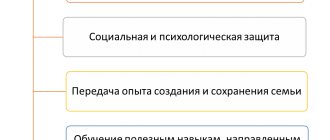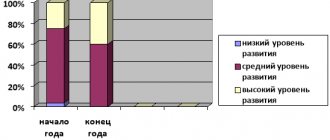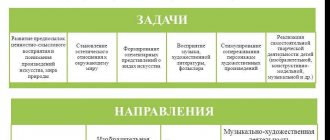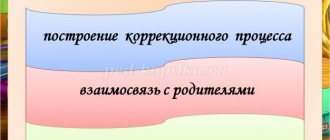Goals and objectives of methodological work
Methodological work is an important condition for improving the quality of the pedagogical process. Having gone through all forms of methodological work, organized in a certain system, educators not only improve their professional level, it becomes a need for them to learn something new, learn to do something that they do not yet know how to do. There are many definitions of the concept of “methodological work” in the literature.
K.Yu. Belaya suggests understanding: methodological work is a holistic system of activities aimed at ensuring the most effective quality of implementation of the strategic objectives of the preschool educational institution.
The task of the senior teacher of a preschool educational institution is to develop a system, to find accessible and, at the same time, effective methods of improving pedagogical skills.
The goal of methodological work in preschool educational institutions is to create optimal conditions for the continuous improvement of the level of general and pedagogical culture of participants in the educational process.
Pedagogical culture is the professional culture of a person engaged in teaching activities, the harmony of highly developed pedagogical thinking, knowledge, feelings and professional creative activity, contributing to the effective organization of the pedagogical process.
Main objectives of methodological work:
- develop a system of providing assistance to each teacher based on diagnostics and forms of work.
- include every teacher in creative search.
Particular tasks can be identified:
- Formation of an innovative orientation in the activities of the teaching staff, manifested in the systematic study, generalization and dissemination of pedagogical experience in the implementation of scientific achievements.
- Increasing the level of theoretical training of teachers.
- Organization of work on the study of new educational standards and programs.
Enrichment of the pedagogical process with new technologies, forms in the education, upbringing and development of the child.
- Organization of work on the study of regulatory documents.
- Providing scientific and methodological assistance to the teacher on the basis of an individual and differentiated approach (by experience, creative activity, education, categoricalness).
- Providing advisory assistance in organizing self-education for teachers.
The main criteria for the effectiveness of methodological work, in addition to performance indicators (level of pedagogical skill, teacher activity), are the characteristics of the methodological process itself:
- consistency - compliance of goals and objectives in the content and forms of methodological work;
- differentiation - the second criterion for the effectiveness of methodological work - presupposes a large share in the system of methodological work of individual and group lessons with educators, based on their level of professionalism, readiness for self-development and other indicators;
- stages – indicators of the effectiveness of methodological work.
The organization of high-quality methodological work in a preschool institution is ensured by a senior teacher. The quality of the educational process in a preschool educational institution depends on his professional competence, active personal position, and professional abilities. These include:
1. Analytical
Analysis:
- the state of the educational process, the implementation of the educational program;
- the level of professional competence of teachers, improvement of their qualifications, certification;
- advanced pedagogical experience;
- the latest research in the field of pedagogy and psychology;
- effectiveness of methodological work.
Forms of methodological work in preschool educational institutions
- Forms of methodological work in preschool educational institutions
(individual, group).
Individual forms of work: conversation, consultations, tests, independent study of theoretical sources, attending classes of more experienced teachers, studying the work experience of colleagues.
Traditional forms of methodological work.
Pedagogical Council
is a permanent body for collegial review of the activities of a preschool institution, a tribune of advanced pedagogical experience. He discusses and resolves issues related to the areas of activity of the preschool educational institution:
- Issues related to the analysis and improvement of educational work in kindergarten.
- discussion of problems related to general pedagogical culture and pedagogical skills of educators, current psychological and pedagogical problems that help overcome shortcomings and difficulties in the work of teachers;
- review of educators' reports;
- introduction of the achievements of pedagogical science and advanced pedagogical experience into the practice of preschool institutions.
- Organizational and pedagogical events:
- discussion of issues of logistics and sanitary and hygienic support of the kindergarten;
- work with parents, public organizations, periodic reporting on the implementation of tasks assigned by the teaching council, providing pedagogical assistance in raising children, organizing and determining the content of the work of the parent committee;
- consideration of certification results and teachers’ reports on the implementation of recommendations, approval of certification characteristics, etc.
Pedagogical councils play a significant role in the implementation of the educational process, at which the state of work in any area is analyzed and an assessment is made of the level of knowledge of children, their abilities and skills in accordance with the requirements of the program. For example, assessing the level of speech development of preschool children and the methods of guiding them by teachers. Discussing such issues, teachers’ attention is drawn to the most valuable techniques and methods of speech development, to existing shortcomings and ways to eliminate them. As a result of active discussion, the team develops a specific action program to eliminate shortcomings and recommendations for improving speech development methods.
At pedagogical councils, the results of mutual visits to groups by educators are discussed, during which teachers learn to correctly perceive business-like criticism of their shortcomings and learn from experience from their colleagues.
Seminars play an important role in raising the theoretical level of educators
. They are conducted with the aim of in-depth study of theoretical issues and methods of education. The organic connection between theory and practice in seminar classes plays a decisive role in the development of practical skills among teachers, the organization of didactic games, experiences and experiments, and the diagnosis of preschool children’s upbringing and training. An example is the “Feed the Birds in Winter” workshop, where educators, under the guidance of a specialist, learn how to make bird feeders in order to teach children how to do this. The topic of the theoretical seminar could be “Main stages, tasks and principles of teaching preschoolers literacy.”
Another traditional form of methodological work is open demonstrations.
, where every teacher has the opportunity to convey their experience and skills. Both classes and other types of activities of the teacher and children can be open: observations on a walk, excursions, experiments and experiments, games in a joint block, entertainment, etc. An open demonstration as a form of methodological work has a teaching effect on teachers, since at first they have the opportunity to observe the progress of work and then discuss it from the point of view of methods of education and training of preschoolers.
Consulting
– one of the traditional forms of work, the purpose of which is to enrich educators with knowledge of current problems of pedagogy and psychology, features of the methods of education and training of preschoolers. To activate the mental activity of teachers and increase the effectiveness of counseling, various active methods are used: questions before starting a consultation, problem statement, analysis of specific situations, heuristic conversation method and others.
Creative groups
. The goal is to create conditions for the growth of activity and initiative of educators, to encourage and encourage their creative search. A creative group is a manifestation of a new approach to the implementation of methodological work with the inclusion of research elements. The logical conclusion and result of the work of the creative group are creative reports from the best educators who share their experiences and talk about problems that arise in practice.
Innovative forms
Methodological work allows the use of new, more effective forms of work that can optimize the pedagogical process for the development and education of preschool children, teach teachers to use innovative forms and methods of work, and increase their theoretical level. Research shows that a teacher’s professional growth occurs only when he has the opportunity to take the position of an active subject of activity in which his creative abilities are realized. Methodological work using active teaching methods helps to identify and improve the best professional and personal qualities of teachers.
Currently, new types of consultations are used in methodological work, for example, consultation - dialogue
.
Such a consultation is carried out by two teachers who have different points of view on the issue under discussion. When considering topics, they present their arguments for each thesis on the board, and listeners choose the point of view that corresponds to their pedagogical views. The next type is a paradox consultation
(or a consultation with planned errors). Its purpose is to draw the attention of listeners to the most complex aspects of the problem being presented and to increase their activity. The methodologist names the number of mistakes (no more than 10) that he will make during the consultation process. Listeners are asked to distribute the material on a sheet of paper into two columns: on the left is reliable, on the right is erroneous, which is then analyzed. The described consultations do not simply convey ready-made knowledge, but force each teacher to actively participate, think, draw conclusions, that is, consciously perceive information.
Innovative forms of seminar classes contribute to the development of activity and creativity. Seminars of a problematic nature
aimed at the holistic formation of scientific pedagogical consciousness among participants: understanding the essence of pedagogical phenomena, psychological and pedagogical problems of development and education of preschool children, the ability to set goals and predict the optimal set of conditions and factors that ensure their development in accordance with social requirements; revealing the logic and contradictions in building a system of pedagogical influences on children; participation in improving the educational process. Let's look at some of the problematic seminars.
Seminar-discussion
is a form that establishes scientific truth based on a discussion of some theoretical or practical issue. The goals of such a seminar can be different: consolidation and deepening of theoretical knowledge, learning the ability to analyze complex pedagogical phenomena, processes from the perspective of science (psychology, pedagogy) and practice, identifying the essence and characteristics of pedagogical experience, teaching skills in organizing the pedagogical process. The creative focus of the seminar-discussion determines the requirements for this form of work:
- The presence of a subject of discussion that is of particular importance for theory and practice.
- The subject of discussion should contain problematic, controversial, not entirely defined or poorly studied issues.
- The discussion is carried out from a scientific and practical point of view.
- The discussion is based on affirmation and denial, proof and refutation, and ends with the formulation of correct scientific propositions (ideas) and pedagogically appropriate ways to implement them in practice.
Such seminars require long and thorough preparation, both for the methodologist and for all teachers participating in the seminar. In addition to mastering a certain amount of knowledge, this form of methodological work contributes to the development of teachers’ speech, the formation of their ability to conduct a discussion, formulate and defend their point of view, and refute the opinions of opponents.
Another type of seminar class is a seminar - pedagogical analysis.
It is aimed at developing the teacher’s pedagogical thinking, his abilities for analysis and synthesis. From the methodological side, this means understanding the achievements of science and the results of teaching activities. This form of seminar involves an analysis of the pedagogical situation, phenomenon, process. The lesson examines the learning outcomes, the level of development of children, and develops a system of the most appropriate pedagogical influences.
educational crossword puzzles and punch cards has become widespread
This form of work helps clarify teachers’ knowledge on a specific topic (tasks of speech development at different age stages, methods and techniques of teaching in the classroom, ways of organizing extracurricular activities, etc.), and therefore affects the quality of work with children.
Methods for activating teachers when conducting methodological activities.
Activation of creative activity of teachers is possible through non-traditional, interactive methods
and forms of work with teachers. Many major methodological innovations are associated with the use of interactive teaching methods. Interactive learning is a special form of organizing a particular activity. She has quite specific and predictable work goals in mind. One of these goals is to create comfortable learning conditions, such that the teacher (student) feels successful, intellectually competent, which makes the entire learning process productive and effective.
The essence of interactive learning is to organize the interaction process in such a way that almost all participants are involved in the process of cognition and discussion. They have the opportunity to understand and reflect on what they know, understand, and think about. Joint activity in this process means that each participant makes his own special individual contribution, has the opportunity to exchange knowledge, his own ideas, methods of activity, and hear different opinions of colleagues. Moreover, this process takes place in an atmosphere of goodwill and mutual support, which makes it possible to gain not only new knowledge on the problem under discussion, but also develops the pedagogical activity itself and transfers it to higher forms of cooperation and cooperation.
Interactive activity involves the organization and development of dialogue communication, which leads to interaction, mutual understanding, joint decision and acceptance of the most common, but significant tasks for each participant. Interactive learning eliminates the dominance of either one speaker or one opinion. In the course of dialogue, teachers develop the ability to think critically, reason, and solve controversial problems based on an analysis of the information they hear and circumstances. Teachers learn to weigh alternative opinions, make thoughtful decisions, express their thoughts correctly, participate in discussions, and communicate professionally with colleagues. To do this, different forms are organized in the classes of professional associations - individual, subgroup, paired, role-playing games are used, documents and information from various sources are analyzed.
Let's look at some of the forms of interactive learning.
Business games
there are the following types:
- imitation, where copying is carried out followed by analysis.
- managerial, in which specific management functions are reproduced;
-research related to scientific research work, where methods in specific areas of children’s speech development are studied through play;
- organizational and active. Participants in these games simulate the early unknown content of an activity on a specific topic.
-training games. These are exercises that reinforce certain skills;
- projective games, in which one draws up one’s own project, an algorithm for some actions, an activity plan, and defends the proposed project. An example of projective games could be the topic: “How to conduct a lesson on the development of coherent speech in preschoolers?” (or parent meeting, or practical seminar, etc.).
Game modeling includes various forms of creative search: brainstorming, discussions, synectics methods, didactic performances, pedagogical sketches.
The main goal of the game is a live simulation of the educational process, the formation of specific practical skills of teachers, rapid adaptation to updating the content, the formation of their interest and culture of self-development; development of certain professional skills and pedagogical technologies.
Business (role-playing) game is an effective method of interaction between teachers. It is a form of modeling those systems of relations that exist in reality or in one or another type of activity, in which new methodological skills and techniques are acquired.
Business games allow you to realize and develop the potential capabilities of each teacher, maximizing the process of mastering methodological ideas and techniques. The most significant point of this technique is its originality as a gaming activity, where independence, initiative, activity and creativity are maximally manifested. The game can be used in the form of modeling, imitation and competition. The following types of game simulation exist:
- Representative, involving the presentation of the most significant, significant or characteristic phenomena, situations;
- Variable, the main task of which is to select an option for performing an activity to an existing one;
- Problem-based, focused on studying the professional activities of a teacher, followed by finding a solution in relation to a specific situation;
- Adaptive, which uses as a basis a known method of solving problems that adapts to given specific conditions;
- Heuristic, which involves searching for an independent, original solution to a particular professional problem;
- Transformative, consisting in changing the given (for example, drawing up an alternative lesson notes).
Game simulation conditions
contribute to the use of reserve capabilities of teachers, getting rid of stereotypes and patterns of mental activity, which is especially important for the implementation of innovations in the pedagogical process. The use of business games during methodological activities has several stages. Firstly, the creation of a problem situation, the introduction of a modeling (game) situation. Secondly, the deployment of game action. Third - summing up the results of the game, and in conclusion - reflection on the course and results of game actions, analysis of the pedagogical situation.
Let's look at the most interesting examples of business games used in methodological work.
Two teams participate in the “Press Conference” game: “correspondents” representing newspapers, magazines, television shows, and “famous scientists, psychologists and teachers.” Each team receives the task of familiarizing itself with the topic of discussion, studying the necessary materials, and the views of scientists on this problem. Directly at the “press conference,” correspondents interview scientists. All participants express opinions, make assumptions, and evaluate the problem under discussion. This form of organization allows all teachers to participate in the preparation and conduct of methodological events.
Participants in the Journey game move from point to point, completing various tasks and answering questions.
In the “Complete and Solve” game, teachers need to supplement and complete problems, draw a conclusion from the information presented.
The game “Give a solution, evaluate it” allows you to teach teachers to analyze and evaluate the activities of colleagues, the effectiveness of using a particular method and technique, forms of organizing the educational process, etc.
New forms of methodological work include simulation games
. The basis for the effectiveness of such games is that a group of participants imitates a certain pedagogical situation, proposes and discusses a number of different solutions. An example is the method of simulating a teacher’s working day. Its essence lies in the fact that teachers model their working day taking into account the characteristics of the children’s age group, goals and tasks that need to be solved. In conclusion, a discussion and analysis of all the proposed models, their positive and negative aspects from the point of view of the effectiveness of solving speech problems, is organized. In addition, a fragment of a lesson, a game-based learning situation, one of the techniques for individual work on speech development, etc. can be modeled.
Imitation and modeling games include dramatizations, which are aimed not so much at mastering specific knowledge, but at developing the personality of teachers. At the initial stage of using dramatizations, participants are offered sketch games aimed at developing attention, memory, observation, and imagination, which contributes to better knowledge of each other. Subsequently, teachers perform more complex individual sketch tasks related to the expression of various attitudes towards themselves, colleagues, and children. The finale of theatrical sketches is improvisational in nature, when each participant finds himself in a situation of moral choice. The point of such tasks is to transform external requirements into internal ones, develop the ability to “see a problem,” and suggest ways to solve it.
The game modeling method increases interest, causes high activity, and improves skills in solving real pedagogical problems. The organization of methodological events in the form of business, simulation, theatrical and other games allows each participant to solve pedagogical problems themselves, and not just be an observer, to create a potentially higher opportunity to transfer knowledge and experience to a real situation. Such forms of work create the most effective conditions for nurturing receptivity to the new, for developing a motivational and value-based attitude towards pedagogical innovations.
These and other innovative methods and techniques for organizing methodological work help to increase its effectiveness, which is reflected in the quality of teaching activities and, consequently, in the level of development and education of students.
Types of methodological work
Analysis of the psychological and pedagogical literature of scientific research allows us to identify different types of methodological work. According to the definition of S.Zh. Goncharova, “methodological activity is a specific type of educational activity, the content of which is the systemic unity of creating a method, its testing, introducing the method (obtaining methods), and applying methods.”
In the process of methodological activity, these spaces are interconnected into 3 stages of methodological activity, which are a single chain of certain elements, in which each stage has a final product: method, technique, guaranteed result.
It is possible to identify the main actions of the senior educator in each of these spaces.
When creating a search for a method of working with children: description, comparison, identification of patterns, expert opinion on significance, etc.
When introducing the method into the work of teachers: information, training, dissemination, experimental work, reproduction, etc.
When applying a methodology or method, the main emphasis is on control over the implementation of the main provisions and correction of this methodology.
Methodological office-center for methodological work in preschool educational institutions.
The center of all methodological work of the preschool educational institution is the methodological office. He plays a leading role in assisting teachers in organizing the educational process, ensuring their continuous professional self-development, generalizing best practices, and increasing the competence of parents in matters of raising and educating children.
The methodological classroom of a preschool institution meets such requirements as information content, accessibility, aesthetics, ensuring motivation and activity in development, and content. The implementation of the information and analytical function of managing a preschool institution determines the formation of an information data bank in the methodological room, where sources and content are determined.
All manuals and materials of the method room are intended for differentiated assistance to educators in their work with children to improve the qualifications of teaching staff, as well as to collect, study and generalize the best work experience.
In the methodological office of the preschool educational institution, exhibitions are regularly organized: ongoing and occasional. Permanent exhibitions are, for example, the following: “New Literature,” “Introduce children to nature (by season),” “To help the teacher,” and others. Only the title of the section is constant, but the material and content change.
The topics of exhibitions are very diverse, but when designing them, some recommendations are followed:
If there is a regulatory or instructional document on this topic (regulations, instructions, etc.), then a plan for its study, recommendations for teachers on working with it, experience of working with this document from other preschool educational institutions, etc. are presented.
Methodological recommendations on this topic.
Work experience related to this topic.
Literature on this topic.
Visual material related to this issue: list of equipment, diagrams, drawings, samples of crafts, paintings, slides, videos, etc.
In addition, the methodological room presents new material from various sources, attracting the attention of teachers to the problems of education and training, helping to prepare for competitions, informing about events and changes in preschool education, making them think about pedagogical situations, and reflect on their work.




